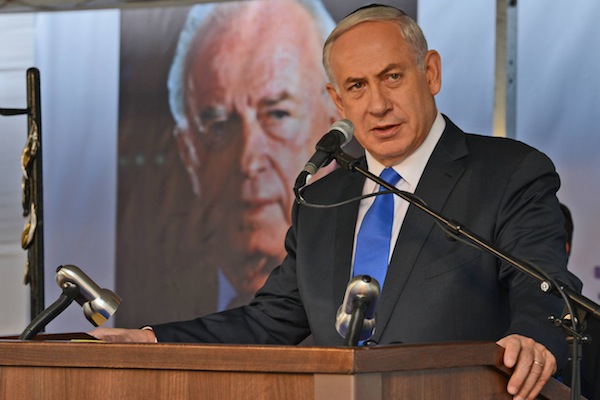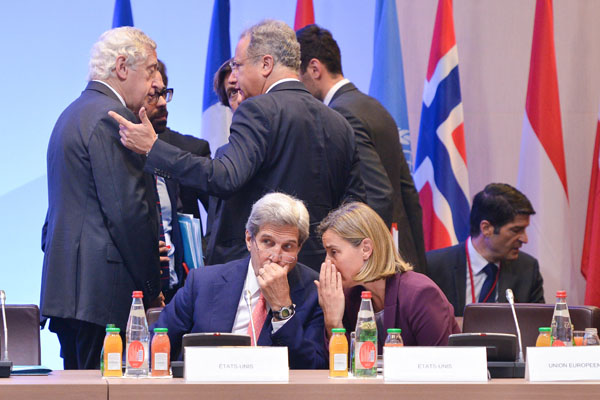What kind of hope does the prime minister offer us when every attempt to bring about peace is rejected as a plot to destroy Israel?
By Yossi Dahan

Less than a year ago, in a rare moment of honesty, Prime Minister Benjamin Netanyahu presented his vision for Israeli citizens, in present and future tense. It happened during a meeting of the Knesset Foreign Affairs and Defense Committee, which came together to mark the assassination of Prime Minister Yitzhak Rabin. “These days there is talk about what would have happened if someone or other would have remained. This is not relevant… we will forever live by the sword.” From Netanyahu’s blood-soaked vision, as opposed to, say, Rabin’s vision of hope, we can tease out his worldview and political behavior. In fact, his remarks summarize his continual refusal to respond to every single initiative that attempts to bring about the end of the conflict between Israel and the Palestinians through negotiations.
In Netanyahu’s eyes, every peace initiative is nothing more than a plot intended to put an end to the State of Israel — a death trap that we must escape using every trick in the book. This thinking also explains Israel’s behavior over the past few weeks, including Netanyahu’s upcoming trip to Europe, where he will try to block every opportunity that may bring about negotiations between Israel and the Palestinians, while seeking to soften the tone of an upcoming Quartet report on the frozen peace process, which will likely include harsh language regarding Israel’s settlement activities in the occupied territories.
Netanyahu stridently rejects all peace initiatives. During a Likud party meeting several weeks ago, he sent the Saudis, who proposed the Arab Peace Initiative back in 2002, to update their plan according to Israeli demands. Then he rejected the Paris Peace Initiative, which was accepted by foreign ministers of 28 EU member states. The main goal of the initiative was to assemble an international peace conference by the end of the year, in order to cause the Israelis and Palestinians to renew negotiations.

The French plan includes putting together economic incentive packages for Israel and the Palestinians, and creating steps to build trust between the two sides. The Foreign Ministry spokesperson, who reports directly to Netanyahu (the prime minister is also Israel’s foreign minister), rejected the initiative outright when he declared that, “peace with the Palestinians will be reached through direct, bilateral negotiations with no preconditions.” A decisive position. However, we must remember that Netanyahu himself created a precondition for continuing negotiations: the Palestinian Authority must recognize Israel as the nation-state of the Jewish people. This demand did not arise until 2007, and Netanyahu knows that the Palestinians, who recognized Israel in 1993, will refuse to accept it.
This is how Netanyahu blocks two paths to negotiations. For Israel the international path is illegitimate, since only direct negotiations will bring peace, Meanwhile the path of direct negotiations has become completely neutralized due to Netanyahu’s demand that Palestinians declare their support for Zionism.
Let’s not forget that Netanyahu’s rejectionism does not stem solely from his despairing vision — it also serves his political needs — mostly survival — by prioritizing the ideology of his base among the Israeli Right. This comes at a time when criticism from both Likud members and ministers has become more extreme, and when Education Minister Naftali Bennett, Netanyahu’s main political rival, is saying things like, “you cannot support Eretz Israel in Hebrew and establish Palestine in English” — a sentence that will surely accompany the prime minister as he travels to Europe.
But what kind of life is promised to a society whose political leadership promises only “blood, sweat, and tears” without any hope for a better future? A society in which citizens are constantly asked to make sacrifices — the kind of sacrifices we never see our prime minister making. A society that lives with no security, under the threat of terrorism. A society that lacks solidarity and suffers from inequality and poverty.
Netanyahu succeeds in showing us that we can continue to maintain such a society as long as citizens are told that the quality of life is of less importance. If you listen to him, Israelis are facing constant threats: Iran, ISIS, Hamas, Hezbollah, Arab citizens, the Left, left-wing NGOS. And of course, the greatest threat of all: peace plans.
Yossi Dahan is a law professor, the head of the Human Rights Division at the College of Law and Business and the co-founder of Haokets. This article was first published in Hebrew in Yedioth Ahronoth and Haokets.


